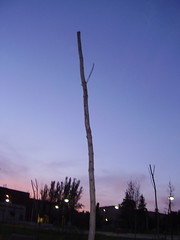keeping alvarez alive
One of the things that struck me the most about the readings this week was the simultaneous sense of overload and loss. It's an exciting and also uncertain time, when everyone seems to be scrambling and regrouping. Rosenzweig's article left me feeling particularly bewildered. I had never really thought about the life span of a digital document. I might need the help of an archeologist in ten years to access material that I created today! I'm glad that I read that first and Turkel's last, because he takes the conversation back to why digital projects open up new and compelling horizons for history in the first place. I was also wondering why people are taking so much trouble to scan books. The books are there. One of the greatest virtues of scanning all the books in the world is that people will be able to find more books. But couldn't a really good global card catalog do that anyway? I know it seems like a silly observation, but why do the books have to be entirely searchable? Shouldn't more emphasis be put on searching effectively rather than digitizing everything? Or does digitizing everything change the way we search for the better?
For my project this semester I've been thinking of creating what I hope to be a somewhat manageable website regarding the subject of my masters thesis. I will likely use what we've learned about databases so far in my larger research for my dissertation, but I just don't have access to all that material right now and I still have to think through the questions I want to ask properly before I start thinking about how to ask them. The good thing is that the material from my previous project is finite. It is a collection of letters, diaries, manuscripts, novels, and a radioplay, written by María Alvarez, a Salvadoran feminist whose activism prompting the passing of suffrage (constitutionally, if not effectively) in El Salvador in 1939.
I have some ideas that I'm quite excited about.
1) It happens that my fiance records music in his spare time, so we have some pretty nice recording equipment in the basement. I thought it would be great to ask a few friends, native Spanish speakers, to act out the widely successful radio play that Alvarez wrote in 1959, a turning point in Latin American history. I could divide the chapters into several podcasts and make them available on the website after a brief synopsis. The radio play is fascinating because the Cuban Revolution happened right in the middle of it and you can see Alvarez trying to make sense of it, torn between anti-communism and a kind of nationalist admiration. It also shows a time in Salvadoran history, now largely forgotten because we see everything through the lens of the civil war, when Christian Democracy was quite compelling to a lot of people, and moreover, that it was closely linked to the feminist movement. It will surprise people that there was a feminist movement in 1959 at all. This is the most exciting part of my project, I think, because it will enable me to try to approximate the original form. I hate reading plays as if they were prose. The original recording was lost in a bombing of the radio station in the 1970s (it was the Catholic YSAX through which Archbishop Romero broadcast his homilies).
2) I always thought it was interesting as I was reading all her novels that she referenced so many Latin American political works. I was curious about this network and looked up some of the key figures, but I never bothered to be thorough about it. I could actually go through her writings and write down all the names and books she mentioned and then do a Google search. In the end I could reconstruct the network and have links to fellow feminists, political figures, writers, etc.
3) I just don't know what to do with her novels and other documents. As I have never undertaken a project like this before, I don't know if it would be feasible to scan them and make them searchable. Given my lack of experience, I'm not sure if I will know how to keep this website alive.
But before addressing these question, I have to address the bigger question that is looming: copyright. She was my great grandmother and my entire family entrusted these documents to me when I was writing my thesis. She published her feminist magazines herself. All the books are out of print and didn't sell much in the first place. One of them was published in Buenos Aires, one in Madrid, and one in San Salvador. The radio station still exists but lost its archives in the fire. I know I can't use the letters because a friend of mine photocopied them for me at the Women's Archives at Radcliffe College in the papers of Doris Stevens -- but what about everything else?
My question about IUScholarWorks is also in this vein: are papers copyrighted? What if a paper becomes a part of a book later on?


0 Comments:
Post a Comment
<< Home